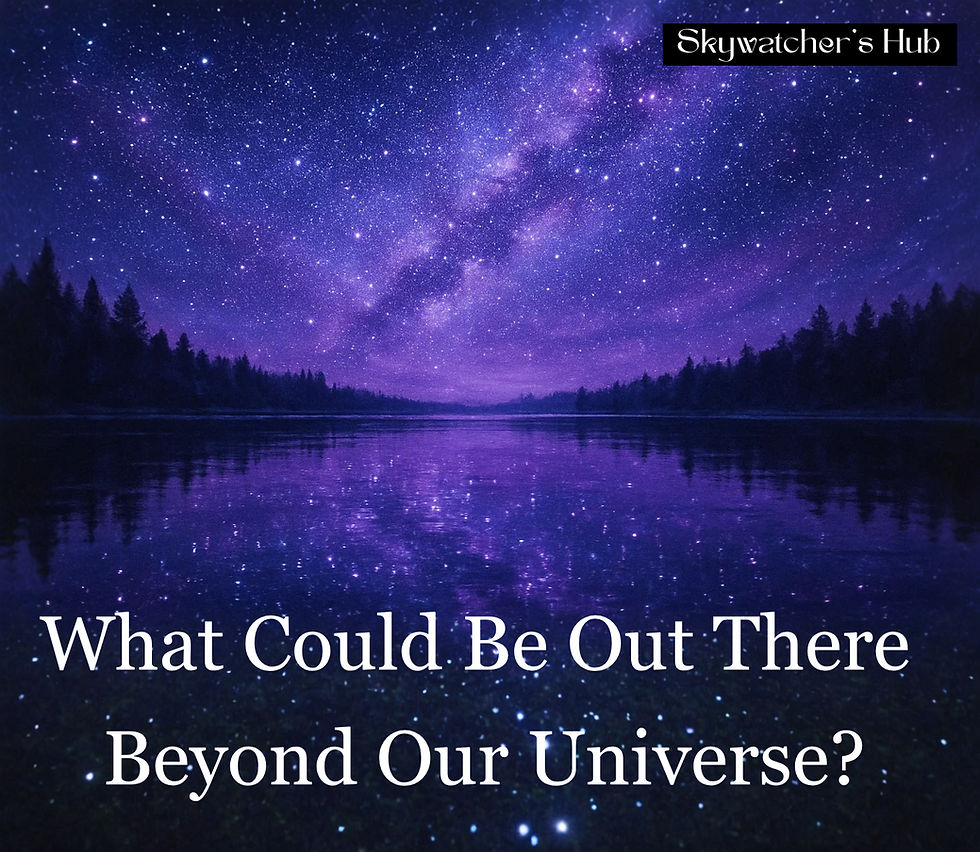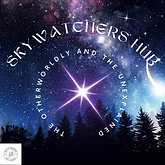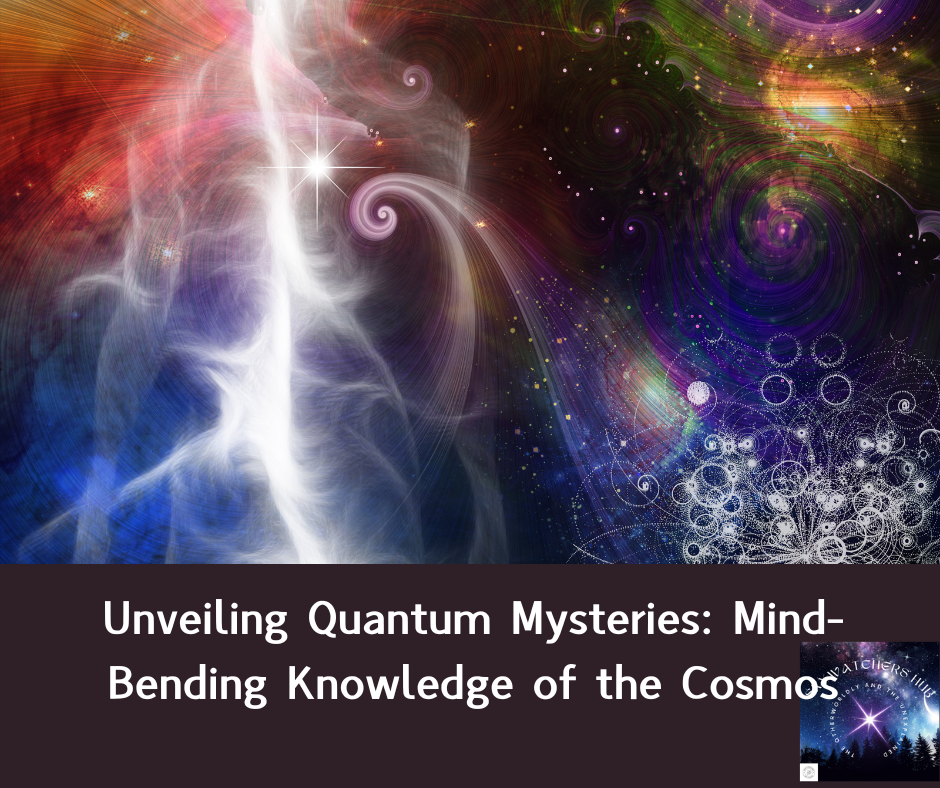What Could Be Out There Beyond Our Universe
- Skywatcher's Hub

- May 25
- 4 min read

The vastness of the universe captivates our imagination and invites us to wonder: what lies beyond? This limitless expanse has fueled the curiosity of scientists, philosophers, and dreamers throughout history. Exploring these possibilities can reveal deeper truths about the nature of reality and our existence.
In this post, we will examine different theories about what may exist beyond our universe. From the multiverse concept to pocket dimensions, let's embark on an enlightening journey through the cosmic wilderness that extends beyond our known space.

The Observable Universe

Before we explore the unknown, let's clarify what the observable universe is. It includes all celestial bodies, light, and matter that we can see, stretching approximately 93 billion light-years in diameter. Beyond this point, light from the Big Bang hasn’t reached us yet.
This limitation suggests that while we have accumulated valuable insights into observable regions, our understanding of what exists beyond is minimal. Our quest for knowledge pushes us to question whether other forms of reality exist just outside our view.

The Multiverse Theory

The multiverse theory proposes that our universe is only one among countless others. Each universe may have its own physical laws and dimensions, creating a potential infinity of alternate realities.
Consider a universe with 10 times greater gravity or one where time flows backward. These possibilities hint that the laws of physics could vary significantly. Some theorists estimate there might be up to 10^500 different universes based on mathematical models, each telling a unique story about existence.
This intriguing theory opens up discussions about variations of life and alternate versions of ourselves. If each universe holds its own history, we might revisit age-old questions about destiny, choice, and identity.
Pocket Dimensions and Wormholes

Pocket dimensions, often described as "alternate dimensions," are exciting concepts in contemporary physics. These self-contained universes could coexist alongside our own. Some theories suggest that black holes may serve as gateways to these realms.
If black holes are indeed portals, what feels like an end could actually connect us to a different universe. For example, some researchers theorize that a black hole’s singularity might give access to dimensions with entirely different laws of physics.
Wormholes are another fascinating idea. These theoretical passages could link distant parts of our own universe or even connect entirely different ones. Imagine traveling across vast cosmic distances in just moments, transforming our understanding of time and space.

Cosmic Inflation and Beyond Our universe
Cosmic inflation suggests that our universe experienced rapid growth shortly after the Big Bang. If this occurred, our universe might be just one section of an extensive, ever-expanding cosmos filled with regions of different properties.
In this framework, other "bubble universes" could have emerged, each with unique characteristics. Researchers propose that each bubble might have different constants like gravity or the speed of light. This idea invites speculation about the richness and diversity of universes potentially surrounding us.
Quantum Physics and the Infinite

The world of quantum physics introduces even more thought-provoking ideas. The concept of quantum superposition implies that particles can exist in multiple states simultaneously until observed.
This leads to fascinating possibilities regarding parallel universes. For every choice made, a new universe may branch off. With approximately 70 million decisions made daily by an average person, one can imagine an astronomical number of alternate realities existing at every moment.
As we consider the implications of quantum mechanics, our understanding of the universe grows increasingly complex. Each action can resonate across an infinite spectrum of outcomes, suggesting that the boundaries we perceive may not exist.
Philosophical Perspectives

The exploration of what lies beyond our universe doesn't solely belong to the realms of science; it also invites deep philosophical discussions. The question of reality can challenge our notion of consciousness and existence.
Some philosophers postulate that our universe could be a simulation—a construct of our collective minds. If this is true, it leads us to wonder what lies beyond this design. Our understanding of cosmic truths remains limited by our perceptions, pointing to a profound mystery waiting to be unveiled.
Pondering these possibilities not only deepens the inquiry into our existence but also engages thinkers from various fields. If our universe is indeed a simulation, the question remains: who or what is the architect of this reality?

The Search for Answers
As we contemplate what might lie beyond our universe, it is crucial to acknowledge the importance of scientific research. Astronomers and physicists strive to find new ways to expand our understanding of the universe’s edges and what exists beyond.
With advanced technology, telescopes have become more sophisticated, allowing researchers to gather data about galaxies, cosmic radiation, and dark matter. These insights may lead to answers about our cosmic environment.
Theoretical physicists continually work on developing models and equations to explain the conditions of potential other universes or dimensions. This ongoing pursuit underlines humanity's natural curiosity and desire to comprehend the complexities of the cosmos.
Expanding Beyond Our Horizons

To ask, "What lies beyond the universe?" is to embark on a thrilling quest filled with speculation and wonder. Concepts such as the multiverse, pocket dimensions, and quantum realities hold incredible potential for understanding our universe and beyond.
While current knowledge is limited by our observations, the allure of the unknown inspires both scientific and philosophical discussions. Each hypothesis prompts new questions, igniting our desire for exploration.
Though the vastness beyond our universe may remain elusive for now, each step we take in our search for answers contributes to the knowledge that we are part of something much larger. The pursuit of understanding itself serves as a beacon of hope, reminding us to keep looking, dreaming, and contemplating the immense wonders that lie just beyond our cosmic grasp.

.png)








Comments